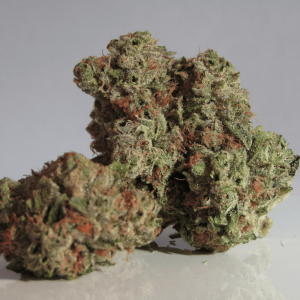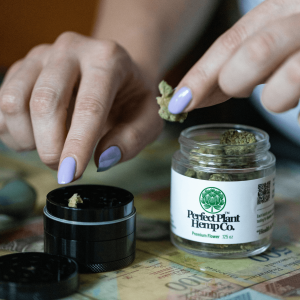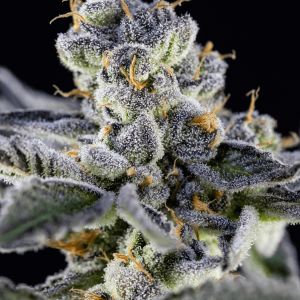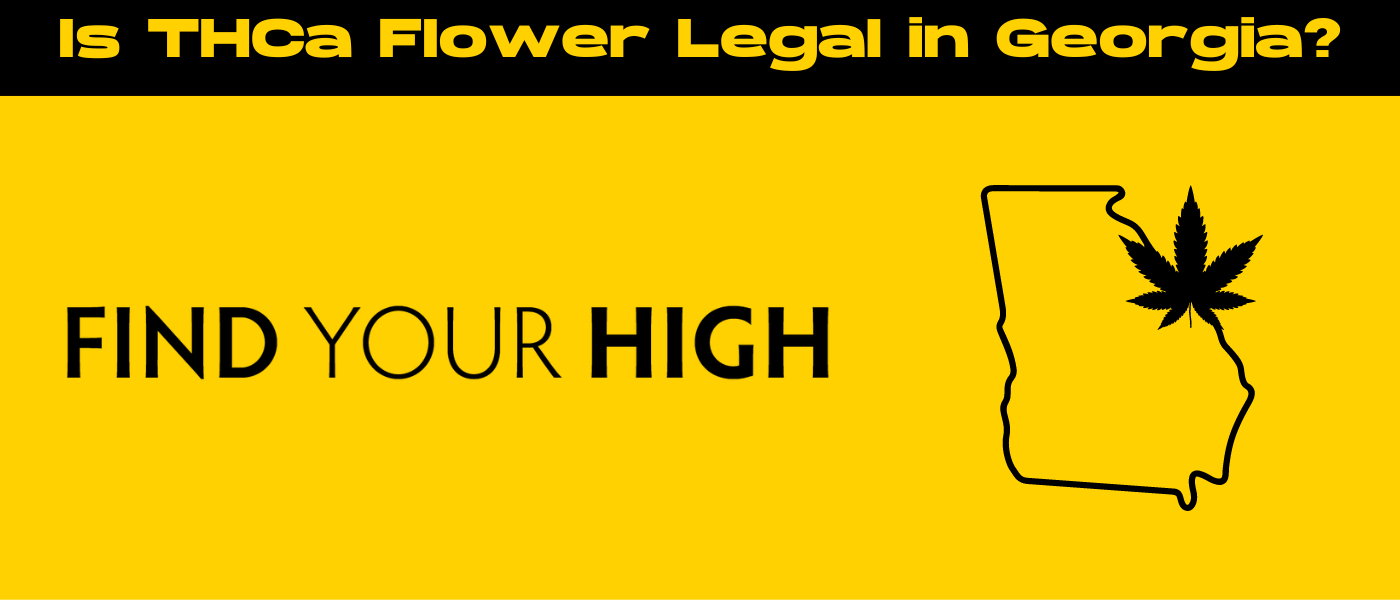Figuring out the legalities of THCa products and cannabis products can sometimes get confusing, as laws can vary greatly from state to state. So, stoners in the Peach State might wonder, “Is THCa flower legal in Georgia?” It’s an important question for both users and businesses to navigate the legal landscape responsibly.
THCa, or Tetrahydrocannabinolic acid, is a non-psychoactive precursor to THC found in raw cannabis plants. Its legal status is a topic of interest due to its potential benefits and the changing legal frameworks surrounding cannabis.
Georgia’s stance on cannabis has slowly evolved, yet remains complex. In this blog post, we will dive into the intricacies of Georgia’s hemp federal and state laws, clarifying the legality of THCa flower under federal law, and breaking down the crucial aspects of understanding these regulations to ensure legality and safety in Georgia.
Let’s get started!
Understanding THCa: The Non-Psychoactive Precursor to THC
THCa, also known as Tetrahydrocannabinolic acid, is a cannabinoid that’s naturally found in the cannabis plant. Unlike its well-known cousin THC, or delta-9-tetrahydrocannabinol, THCa doesn’t get you high.
It’s the raw form of THC found in the cannabis plant, and it only becomes psychoactive when it goes through decarboxylation – a process that happens when cannabis is exposed to heat or sunlight.
So, in a nutshell, THCa won’t give you that ‘high’ feeling associated with cannabis use unless its converted into THC by means of cooking, smoking, vaping, or dabbing.
The Properties of THCa
THCa has its own distinct properties that set it apart from THC. Research on the effects of THCa is still in the early stages, but initial studies indicate it might have some anti-inflammatory and neuroprotective advantages.
These potential therapeutic properties are catching the attention of medical researchers and individuals seeking the medicinal benefits of cannabinoids without the psychoactive effects.
THCa versus THC: Clearing the Confusion
One of the most significant differences between THCa and THC is their effect on the mind and body.
While THC is known for its psychoactive effects, THCa does not affect mental state in the same manner. Only after THCa is converted into THC does it bind with CB1 receptors in the brain, leading to the euphoric and mind-altering effects.
The Role of THCa in the Cannabis Plant
In the cannabis plant, THCa serves as a precursor to THC and is generally present in higher concentrations in live or freshly harvested plants. As a naturally occurring acid form of THC, it is involved in the plant’s defense mechanism and growing process.
Its presence is also important for the breeding and cultivation of cannabis strains with specific profiles for desired effects and potential health benefits.

The Legal Landscape of Cannabis in Georgia
In Georgia, the cannabis laws have historically been pretty strict, but in recent years, we’ve seen some small shifts towards being more lenient, especially for medical purposes.
The state’s Controlled Substances Act still considers marijuana a Schedule I substance, meaning it’s seen as having a high potential for abuse and no accepted medical use. However, things took a definite, though cautious, step forward in 2019 with the “Hope Act” (HB 324), which allows the production and sale of low THC oil for registered patients with specific medical conditions.
There’s been talk among lawmakers about expanding the medical program and making it more accessible, but for now, recreational use is still a no-go.
However, it’s worth noting that the information above specifically reflects THC legality within Georgia, not THCa. Keep reading to learn more about how THCa is actually legal for recreational use across all 50 states.
Understanding THCa Legality: Federal Vs. State Laws
Understanding the ins and outs of THCa legislation can be as tricky as its own molecular structure.
On a federal level, the legality of THCa is tied to the legal status of hemp-derived products, which got the green light under the 2018 Farm Bill.
This groundbreaking legislation removed industrial hemp, defined as cannabis with less than 0.3% THC, from the Schedule I controlled substance category, allowing for the legal cultivation and sale of hemp flower.
The Farm Bill and Its Implications on THCa
The 2018 Farm Bill was a game-changer for the cannabis industry, as it sanctioned the cultivation, production, and sale of the hemp plant and its derivatives, so long as they do not exceed the THC threshold of 0.3% on a dry weight basis.
THCa vs. Delta-9 THC: Legal Implications
THCa and Delta-9 THC might be similar in composition, but their legal implications are actually quite different.
When in its natural state, THCa isn’t considered psychoactive and doesn’t fall under the same strict regulations as Delta-9 THC. The key difference lies in decarboxylation, where THCa turns into psychoactive Delta-9 THC when exposed to heat.
Although both compounds are present in the cannabis plant, the legal consequences for possessing and using THCa are fundamentally distinct from those for Delta-9 THC due to its non-intoxicating effects. This difference is particularly noticeable in how different jurisdictions handle the legality of each substance.
For example, while Delta-9 THC is heavily regulated and often illegal in non-medical or recreational use states, THCa may not face the same legal restrictions as long as it remains non-psychoactive.
Because of this, the presence of THCa in cannabis flower is a bit of a gray area in some state laws. In certain circumstances, the flower might technically be legal even if it comes from the same cannabis plant that could potentially produce psychoactive THC when processed or consumed.
Georgia’s Stance on Cannabinoids and THCa Classification
Under Georgia’s Controlled Substances Act, cannabinoids in general are subject to regulation. However, there are some specific details when it comes to THCa.
Unlike Delta-9 THC, which is considered a Schedule I controlled substance, THCa is not explicitly listed in the Act. This means that THCa might not be subject to the same strict drug laws that apply to psychoactive cannabinoids.
But here’s the catch: if THCa is heated and turns into THC, then it falls under the controlled substances category and can be penalized under state law. So, the legislation is a bit unclear and can lead to uncertainties.
While there are no direct penalties mentioned specifically for THCa possession, converting it into THC raises questions about the legal consequences. Consumers and industry participants need to be careful in this gray area and make sure they are within the limits of what is allowed when dealing with THCa products, which is under 0.3% THC.
Possessing products with THC over the legal limit can result in fines or even incarceration, depending on the quantity and the intent perceived by law enforcement.

Medical Cannabis in Georgia: Understanding the Program and Conditions
Georgia’s journey towards medical cannabis has laid a foundation for patients in need, though with some strict guidelines.
The state’s program currently focuses on “Low THC Oil Registry Cards” for qualifying patients with conditions like cancer, seizures, and multiple sclerosis. The oil must have less than 5% THC by weight, providing medical benefits without the usual high.
Interestingly, the program doesn’t mention the use of THCa flower. Since THCa is non-psychoactive in its raw form, patients and producers face challenges navigating the program without clear guidelines for THCa flower and must stay compliant with state regulations.
Efforts Towards Legalization and Decriminalization
The conversation about cannabis legalization is evolving, and in Georgia, there’s a growing movement pushing for legislative change.
Current bills and propositions are often the result of dedicated advocacy by groups working for reform. These organizations have a big influence on the law-making process, sometimes swaying public opinion with strong evidence about the benefits of decriminalization.
The impact of public support is huge – as people become more aware and the stigma fades, the public is increasingly in favor of a more lenient approach to cannabis laws. This shift in society is crucial because it has the power to push legislative action forward, potentially shaping a more progressive future for cannabis policy in Georgia.
Conclusion
In conclusion, the intricacies of THCa’s legality in Georgia highlight the complex interplay between state and federal regulations. With THCa’s non-intoxicating status providing some flexibility under the 2018 Farm Bill, Georgia finds itself in a legal gray area, allowing THCa under specific conditions—mainly, its non-converted form within the state’s required THC levels.
As the legal landscape continues to evolve, it’s crucial for consumers, producers, and lawmakers to stay informed and actively engage in the legal discussion. The future of THCa laws, as well as broader cannabis reform movements in Georgia, seems poised for change, influenced by public sentiment, advocacy groups, and upcoming legislative reviews.
The ongoing conversation brings hope for more comprehensive, transparent, and equitable cannabis policies in the state.

Frequently Asked Questions
1. Is THCa legal in the state of Georgia?
THCa is not explicitly listed as illegal under Georgia law, particularly if it remains in its non-psychoactive acidic form and within the legal THC limits.
However, when THCa is converted into THC through decarboxylation, it can be considered a controlled substance, potentially leading to legal consequences.
2. Is THCa legal in all states?
The legality of THCa varies from state to state. It is essential to consult specific state laws to determine the legality of THCa, as some states follow federal guidelines while others have more restrictive regulations. However, it’s worth mentioning that THCa is federally legal across all 50 states.
3. Does THCa produce a high?
In its acidic form (THCa), it is considered non-psychoactive and does not produce a “high.”
THCa only becomes psychoactive once decarboxylated, turning into Delta-9 THC, which is responsible for the intoxicating effects commonly associated with cannabis use.
4. Is THCa a felony in Georgia?
Possessing THCa itself isn’t explicitly classified as a felony in Georgia, but if THCa is converted into THC and surpasses the state’s legal THC limit, possessing, selling, or distributing it could result in felony charges, depending on the amount and circumstance.

 Rewards
Rewards




